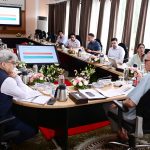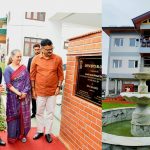TRANSFORMATIVE DIALOGUES
Today, Prime Minister Narendra Modi will be leading the seventh of the annual, much anticipated “Pariksha pe Charcha”. It is perhaps the first of its kind interactive program across the Globe where a country head talks to students about exams and how to traverse its various aspects, including the psychological stress it may bring about.
In a recent statement, PM Modi expressed his belief that the Charcha would transform “stress into success”. He has aptly named students “Exam Warriors,” highlighting the resilience and strength required to navigate the challenges of exams. By engaging with students directly, the PM aims to inspire and motivate them, instilling a sense of confidence and self-belief that goes beyond the traditional exam-centric mindset. The unique initiative seeks to understand and address the challenges faced by students in navigating the complexities of exams. This event goes beyond the conventional narrative by fostering an open conversation on exams, aiming to transform stress into success. Pariksha pe Charcha engages all stakeholders in the system of examinations, the students, the parents, and teachers from across India in a constructive dialogue about the challenges of exams and the mental well-being of students.
Significantly, the government’s approach towards examinations in not limited to just the ‘talk’ but are being adequately addressed through policy decisions. The National Education Policy (NEP) 2020 introduced a paradigm shift in the examination system of India, focusing on regular, formative, and competency-based assessments. The National Education Policy 2020 brought about a revolutionary change in the way we approach examinations. Shifting away from the traditional examination-centric model, the NEP emphasizes regular, formative, and competency-based assessments. This shift is instrumental in fostering holistic development and strong foundational learning. By recognizing diverse talents and learning styles, the new assessment system aims to provide a more comprehensive evaluation of a student’s abilities.
Traditional exams often focus on a student’s performance on a particular day, reflecting a snapshot rather than the overall competence of the individual. The National Curriculum Framework for School Education (NCF) which is based on NEP 2020 addresses this limitation by introducing board exams twice a year. Students will have the opportunity to showcase their skills on multiple occasions, and the best of two scores will be considered. This change not only reduces the pressure associated with a single examination but also provides a more accurate representation of a student’s capabilities over time.
Not just this, even the exam paper setters will undergo training and certification courses, in order to equip them with skills to assess the students for their understanding of the subject and competencies through exams. Moreover, students will take the exams of subjects they feel ready for, discontinuing the practice of mandatory, fixed-frame and time of examinations.
A day ago, the PM wrote on his X account: I am eagerly looking forward to the most memorable gathering of #ExamWarriors, Pariksha pe Charcha to collectively strategize on ways to beat exam stress. Let’s turn those exam blues into windows of opportunities… The social media post reflects how, for the first time, exams have been turned into events to look forward to, a number of activities planned and held in the run-up.
Till now the exams focused on memorization and being able to reproduce what is written in the books and notes, leaving little room for students to develop the ability to analyze, synthesize, and apply knowledge. By encouraging a deeper understanding of concepts and fostering creativity, the new approach to exams would contribute to the development of individuals capable of tackling real-world challenges. India is witnessing a transformative shift in societal attitudes towards education and careers. The success of individuals would no longer solely dependent on exam performance. Students are exploring diverse career avenues that value skills, innovation, and practical knowledge. The changing landscape necessitates a shift in the way we perceive success, moving away from a singular focus on exam results to a more nuanced understanding of individual strengths and talents.
In the era of digital transformation led by India to a great extent, technology plays a crucial role in reshaping education. The emerging policies on education and examinations, acknowledge the potential of technology in enhancing the learning experience. Online resources, interactive platforms, and digital assessments offer new avenues for students to explore and engage with educational content. Embracing technology as a catalyst for learning empowers students with tools that go beyond the limitations of traditional approaches in academics, fostering a more dynamic and interactive educational experience.
The emphasis on personalized excellence recognizes that each student is unique, with individual strengths and capabilities. Moving beyond the one-size-fits-all approach, the new educational paradigm fosters an environment where students can thrive based on their unique attributes. This shift aligns with the broader vision of creating a generation of learners who are well-equipped for the challenges of the 21st century. Moreover, in today’s interconnected world, success is often linked to global awareness and cultural competence. Empowering minds involves preparing students to thrive in a globalized environment.
PM’s Charcha and the National Education Policy 2020 collectively signify a pivotal moment in the history of Indian education. The emphasis on empowering minds and unleashing potential beyond exam stress reflects a broader societal shift towards a more holistic and inclusive approach to learning. Prime Minister Modi’s vision for transforming stress into success is not just rhetoric; it is a call to action for all stakeholders to contribute to the evolution of education in India.
(The author is a freelancer. Courtesy: PIB Srinagar)








